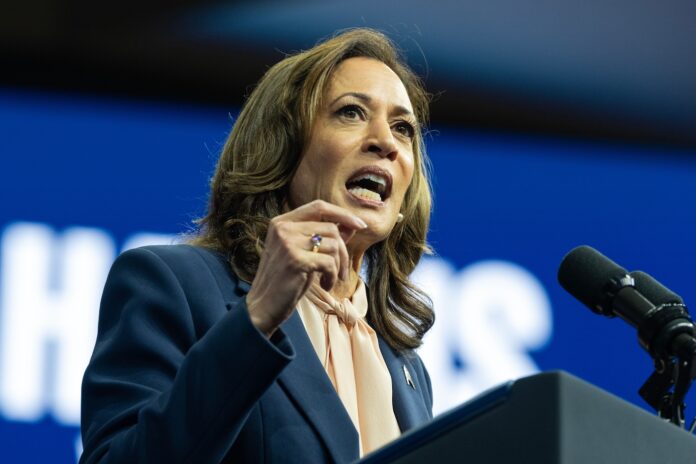WASHINGTON D.C. – Cannabis could become federally legal if Vice President Kamala Harris has her way. The Democratic presidential nominee said she’ll work with Congress to ensure the “safe cultivation, distribution, and possession of recreational marijuana” across the United States if she’s elected in November.
The Harris campaign included its promise to legalize cannabis for adult use as part of a wider agenda to give Black men the tools to build wealth and achieve financial freedom for themselves and their families. The plan also includes a fund of up to $1 million in forgivable loans for Black entrepreneurs starting a new business (up to $20,000 per entrepreneur), the launch of a national health equity initiative focused on Black men, a federal ban on corporate price-gouging for food and groceries, and down-payment assistance designed to triple the number of first-time Black homeowners.
“She will also fight to ensure that as the national cannabis industry takes shape, Black men—who have, for years, been overpoliced for marijuana use—are able to access wealth and jobs in this new market,” her policy page states.
Harris delivered part of her message during an interview on the “All the Smoke” podcast hosted by cannabis advocates and former NBA players Matt Barnes and Stephen Jackson.
“I just feel strongly people should not be going to jail for smoking weed,” Harris said. “I just think we have come to a point where we have to understand that we need to legalize it and stop criminalizing this behavior.”
In 2019, then-Senator Harris co-sponsored the Marijuana Justice Act to end federal cannabis prohibition. At the time, she said making cannabis legal at the federal level was the “smart thing” and the “right thing” to do.
Her running mate and current Minnesota Governor Tim Walz signed his state’s adult-use legislation into law May 30, 2023. Walz has signaled his opinion that cannabis legalization is a matter of states’ rights but believes there’s “work to be done nationally around the banking issue.”
To no one’s surprise, cannabis industry executives spoke positively about the Harris campaign’s announcement.
“As a critical first step toward ending the destructive and counterproductive policies of the War on Drugs, this proposal represents an essential turning point in U.S. drug policy,” said Multidisciplinary Association for Psychedelic Studies founder and Executive Director Rick Doblin. “For way too long, since the Marihuana Tax Act of 1937, these unjust laws have disproportionately targeted marginalized communities, hindered scientific and medical progress, and perpetuated harm and misinformation. By advancing marijuana legalization, Harris is laying the groundwork for a future where drug policy is driven by science, public health, and human rights. Vice President Kamala Harris’ proposal is a fundamental step toward a more compassionate, just, and evidence-based approach to drug policy in America.”
For product manufacturers, federal legalization offers the best opportunity to scale and grow efficiently, according to Ethos Cannabis Chief Executive Officer Gibran Washington.
“Vice President Harris’s plan for cannabis legalization is a landmark shift that will catalyze both industry growth and scientific advancement,” he said. “This stance will unlock unprecedented opportunities for rigorous research into cannabis’ vast therapeutic potential as well as help the current legal industry thrive.”
Adam Wilks, CEO at Carma HoldCo, agreed. “Cannabis legalization is a much-needed catalyst for our industry and the American economy at large,” he said. “This progressive stance promises to revolutionize regulatory frameworks, drive innovation, and generate substantial employment opportunities nationwide. For forward-thinking companies, this paves the way for accelerated growth, enhanced product quality and safety standards, and the expansion of crucial social equity programs.”
While a move to full federal legalization is generally welcome news, the difficult reality of developing and adopting federal regulations with the support of Congress is not totally lost on the industry’s financiers.
“It’s encouraging to see cannabis remains a key issue for candidates in this presidential election, especially as we approach election day, when messaging is most refined,” said Anthony Coniglio, co-founder and CEO at real estate investment trust NewLake Capital Partners. “While the DEA’s proposed reclassification of cannabis from Schedule I to Schedule III under the Controlled Substances Act will be a step forward, for the agency to go further and fully remove cannabis as a controlled substance—similar to how distilled spirits, wine, malt beverages, and tobacco are regulated—would likely require significantly more scientific research than what is available for the current rescheduling process. On the surface, it seems the most expedient way to achieve this is through legislative action, which would necessitate bipartisan support. While we applaud Harris’s commitment to addressing the harm caused by the war on drugs and the disproportionate impact of mass incarceration on communities of color, it remains unclear if there will be enough bipartisan support to fully realize her reform proposals.”
Sundie Seefried, chief executive officer at SHF Holdings Inc., added, “Comprehensive federal reform does offer opportunities for nationwide consistency, but it also introduces significant challenges for both state-level regulators and businesses. The cannabis sector has matured under a state-by-state approach, and I believe removing cannabis from the Controlled Substances Act, rather than full legalization, would be a more practical and immediate step.”
Regardless of the outcome, it’s clear the conversation about cannabis on the national election stage is changing. It’s been ten years since the Rohrabacher-Farr Amendment was signed into law, temporarily prohibiting the Department of Justice from interfering with state-legal cannabis operations.
Despite dozens of efforts to permanently change the status quo over the past decade, federal drug policy reform has crawled at a snail’s pace.
Progress may not feel tangible, but it’s becoming quite glaring with presidential nominees from both major political parties voicing their support for significant cannabis law reform in what’s shaping up as a neck-and-neck race likely decided by a few thousand voters in a handful of swing states. Republican presidential nominee Donald Trump said he plans to vote yes for Florida’s adult-use cannabis initiative in November and supports reclassifying marijuana to a less restrictive Schedule III status under the Controlled Substances Act.
“This is the first time in history that both candidates have indicated they will advance cannabis legalization,” said John Mueller, chief executive officer at Greenlight Dispensary. “This commitment could be the final blow to a failed fifty-year policy that has unjustly impacted countless lives.”











